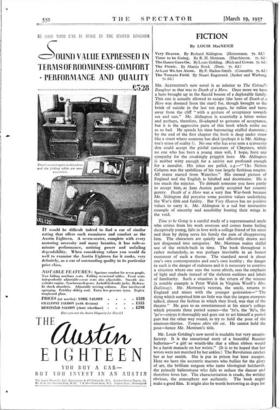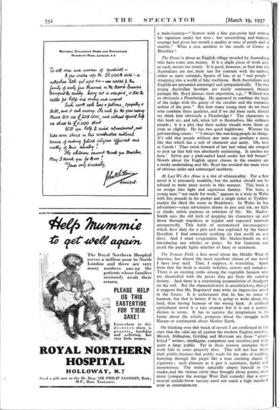FICTION
By LOUIS MacNEICE
Very Heaven. By Richard Aldington. (Heinemann. 75. 6d.) Time to be Going. By R. H. Mottram. (Hutchinson. 78. 6d.) The Dance Goes On. By Louis Golding. (Rich and Cowan. 75. 6d.) The Picnic. By Martin Boyd. (Dent. '7s. 6(1.) At Last We Are Alone. By F. Sladen-Smith. (Constable. 7s. 6(L) The Tomato Field. By Stuart Engstrand. (Secker and Warburg. 7S. 6(1.) MR. ALDINGTON'S new novel is as inferior to The Colonel's Daughter as that Was to Death of a Hero. Once more we have a hero brought up in the flaccid bosom of a deplorable family This one is actually allowed to escape (the hero of Death of a Hero was doomed from the start) for, though brought to the brink of suicide in the last ten pages, he rallies and turns away from the cliff "with a gesture of acceptance towards sea and sun." Mr. Aldington is essentially a bitter writer and perhaps, therefore, ill-adapted to gestures of acceptance, but it is the aggressive parts of this book which strike me as so bad.. He spends his time bayoneting stuffed dummies ; by the end of the first chapter the book is deep under straw like a street where someone has died (perhaps it is Mr. Aiding- ton's sense of reality ?). No one who has ever, seen a university don could accept the pitiful' caricature of Chepston, while no one who has been a young than will, I hope,- have any sympathy for the creakingly priggish hero. Mr. Aldington is neither witty enough for a satirist nor profoinid 'enough for a moralist. His jokes are pallid, "e.g.—" Nelson Column was the umbilicus of his vast largely fictitious empire. All trains started from Waterloo." His mental picture of England and the English is falsified' and doctrinaire. ' He is too much the rejecter. To debunk someone you have partly to accept . him, ai Jane Austen partly accepted her country gentry. Dead:- of a Hero was, a very fine War-book because Mr. Aldington did -perceive some positive values underlying the War's filth and futility. But Very Heaven has no positive values to carry it. Mr. Aldington is a sad but instructive -example of sincerity and sensibility beating their wings in the void.
Time to be Going is a careful study of a superannuated uncle who retires from his work overseas and comes home feeling deceptively ,yoring, falls in love with a college friend of his niece and then by dying saves his family the pain of disapproving 'him. The characters are quietly and effectively drawn and not dragooned into categories: Mr. Mottram makes skilful use of the switch-back in time. The book throughout is rather melancholy, as was perhaps inevitable in an honest treatment of such a theme. The standard novel is about one's own contemporaries and one's own locality ; the danger in such is the danger of staleness and it is necessary to contrive a situation where one sees the scene afresh, sees the emphasis of light and shade instead of the skeleton -outlines and labels of familiarity. Such a situation is the return of the veteran (a notable example is Peter Walsh in Virginia Woolf's Mrs. Dalloway). Mr. M.ottram's veteran, the uncle, returns to England and mixes with the younger generation—" The thing which surprised him no little was that the jargon everyone talked, almost the fashion in which they lived, was that of the theatre." He goes to an entertainment at his niece's college which presents three period scenes—the '70's, the '8o's, the 'no's—enjoys it thoroughly and goes out to act himself a period part but the other way round, to try to hold the pose of the nineteen-thirties. Tempus abire tibi est. He cannot hold the pose—hence Mr. Mottram's title.
Mr. Louis Golding's new novel is, readable but very unsatis- factory. It is the sensational story of a beautiful Russian ballerina—" a girl so wraith-like that a silken ribbon would be a harsh manacle ori her wrists." (It is to be hoped that her wrists were not matched by her ankles ) The Revolution catches her at her zenith. She is put in prison but later escapes. Here we have the eccentric maestro who bullies for the glory of art, the brilliant surgeon who turns ideological bolshevik, the princely balletomane who fails to seduce the dancer and therefore loves her. The characterisation is crude, the writing obvious, the atmosphere not authentic. The book might make a good film. It might also be worth borrowing as dope for a train-journey—" Sorrow with a fine pen-point had written his signature under her eyes ; her unremitting and majestic courage had given her mouth a quality at once of petals and of marble." What a nice antidote to the smells of Crewe or
Bletchley !
• The Picnic is about an English village invaded by Australians who have come into money. Ills a sligfu piece of work and, as such, moves too slowly. It is good, however, to find that the Australians are not.there just' for 'contrast with the natives, 'either as mere colonials, 'figures of fun, or as" real people" ;strapping into a world of fake traditiona.. Both Australians and English are presented amusingly and sympathetically. The two Young' Australian brothers are nicely contrasted, though perhaps Mr. Boyd labours their exposition, e.g., "Wilfred was so obviously a Phunbridge. He appeared to combine the logic of the judge with the gaiety of the Cavalier and the romantic • ardour of the poet." But how many young men do we. meet who combine these .qualities, and if we did meet such, should we think him' obviously a .Plumbridge ? The characters in this book act, and talk, when left to themselves, like ordinary people ; it is a Pity that their 'ainhor should write them up even so slightly. He has two good highbrows. Witness the girl watching tennis : "I always like watching people do things. It's odd that people without any taste can produce a scene like this which has a sort of character and unity. Oh, look at Carola ! That swish forward of her hair when she stooped to pick up that ball was absolutely enchanting. It catches me here.' Sylvia put a pink-nailed hand under her left breast." Novels about the English upper classes in the country are a tricky undertaking and Mr. Boyd has avoided the Main vices of obvious satire and submerged snobbery.
At Last We Are Alone is a riot of whimsicality... For a first novel it is extremely _readable, but the author should not be advised to write more novels in this manner.' This book is an escape into light and capricious fantasy. The hero, a young 'man," not made for work," appears' in a train in Wales with fiye pounds in his pocket and a single ticket to Tyddyn- madyn (he liked the name in Bradshaw). In Wales he has adventures—crazy adventures drawn in pen and ink, no light or shade, satiric purpose or criticism of life. Mr. Sladen- Smith uses the old trick of popping his characters up and down through trapdoors it regular and expected intervals unexpectedly. This habit of systematised inconsequence which does duty for a plot and was exploited by the Greek Novelists I find extremely soothing (in that world no one dies). And I must congratulate Mr. Sladen-Smith on not introducing any witches or pixies. So few fantasists can avoid the purple lights whether of faery or sentiment.
The Tomato Field, a first novel about the Middle West of America, has almost the most repellent climax of any novel I have ever read. That, I suppose, is something. Apart from that the book is mainly radishes, carrots and tomatces. There is an exciting strike among the vegetable farmers who are dissatisfied with the prices they get from the canning factory. And there is a.convincing accuntulatiOn of drudgery on the soil-. But the characterisation is unsatisfactory, though it suggests that Mr. Engstrand mlly write an Impressive novel in the ,future. It is unfortunate that, he has no sense of humour, but that- is better, if he is 'going- to write-about the land, than having humour of the wrong kind. A civilised agricultural novel- is a' rare 'creature but it is' not a contra- diction in terms. It has to survive the temptations to be funny about the yokels, pomPoUs about the' struggle with Nature or sentimental about Mother Earth.
On thinking over this batch of novels I am confirmed in the . view that the odds are all against the modern English novelist. Messrs. Aldingion, Golding and Mottram are three " estab- lished " writers, intelligent, competent and sensitive, and with quite a large public. Yet in these present examples their work fails to come properly alive. This will not lose them their public, because that public reads for the sake of reading, hurrying through the pages like a- man smoking chains of cigarettes ; such pleasure as it gets is automatic, feeble and monotonous. The writer _naturally adapts himself to his reader, and the vicious circle thus brought about proves once *more' (compare the average' West End comedy) that- a com- mercial middle-brow success need not reach a high standard even as entertainment.





































































 Previous page
Previous page